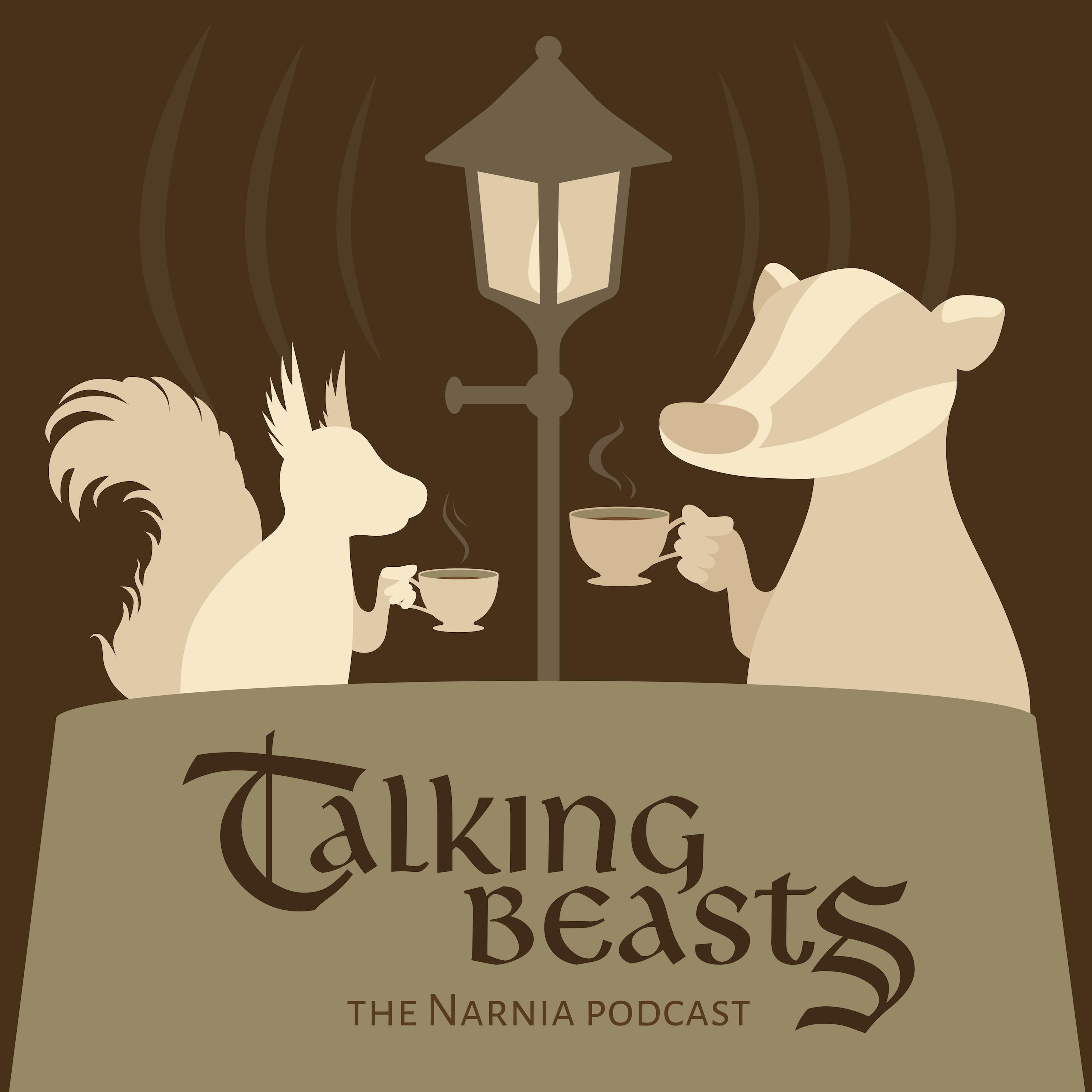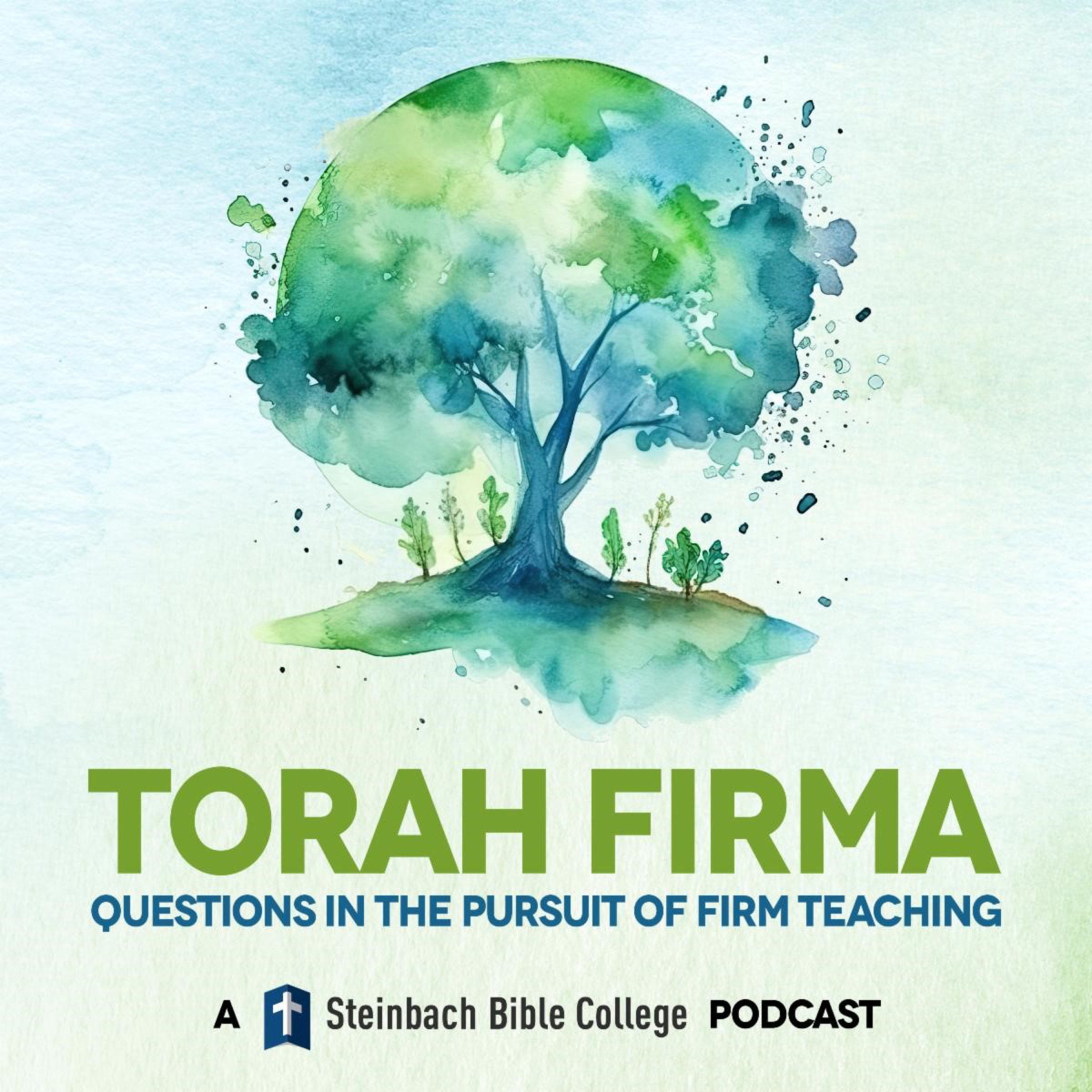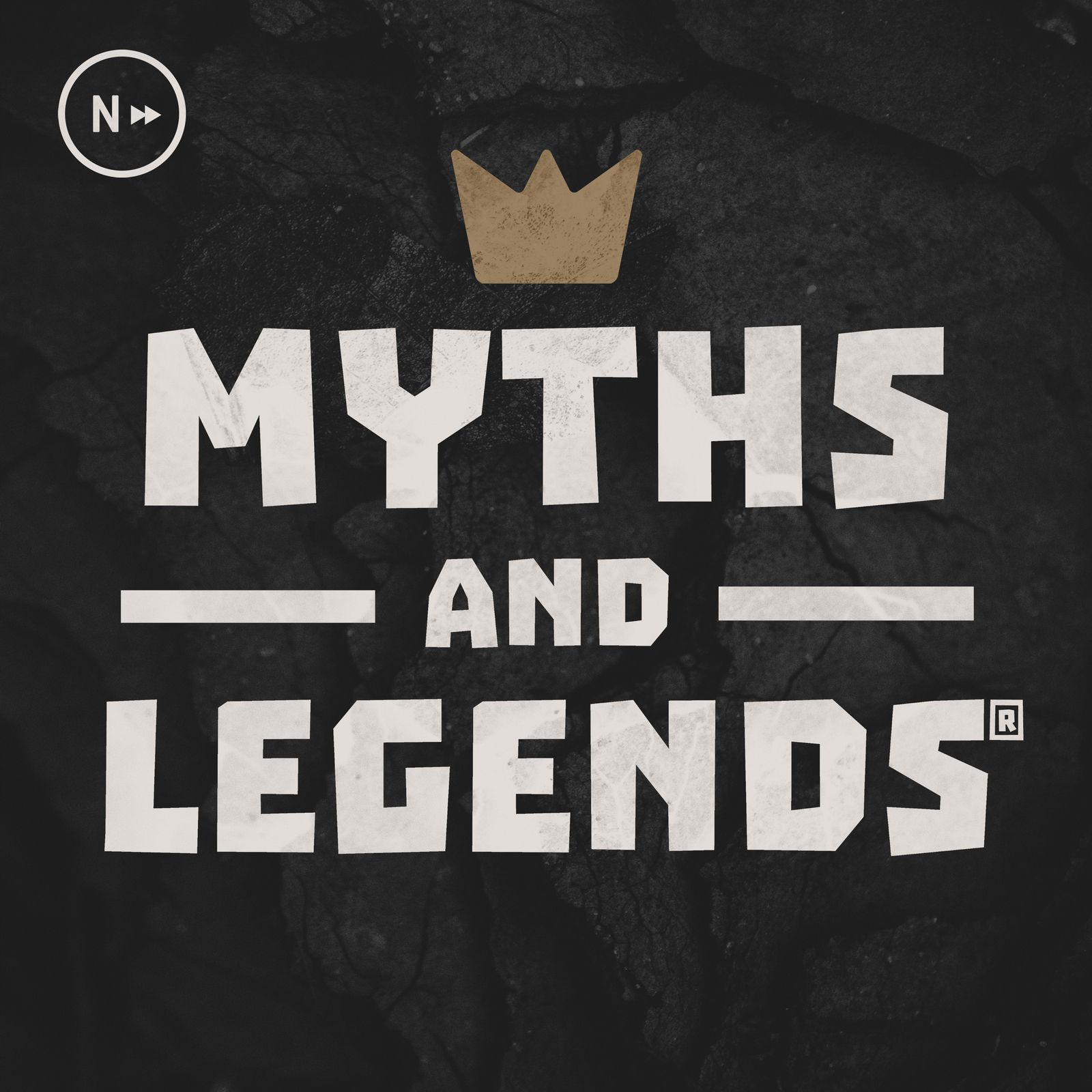
Faithful Fables
Faithful Fables is a faith-based podcast dedicated to exploring Christian themes in adult and youth fantasy stories including The Chronicles of Narnia, The Lord of the Rings, and more! If you love fantasy stories and you’re interested in the possible Christian themes in said stories, this may just be the podcast for you!
Faithful Fables
Prince Caspian Explained: Magic, Power, And Faith (Narnia Lore)
We trace the Pevensies’ sudden return to a changed Narnia, Caspian’s rise from hunted prince to humble king, and how Aslan’s presence reorders power, faith, and even the forest itself. Battles, betrayals, and a broken bridge become a lesson in leadership and belief.
Leave a rating wherever you’re listening and drop a comment—your note may be featured in a future episode. There are links in the description to support the show or leave a voice message. Stay tuned for the next episode, and until then, Stay Faithful
Website: https://faithfulfables.buzzsprout.com
YouTube: https://www.youtube.com/@FaithfulFablesPod
Instagram: https://www.instagram.com/faithfulfablespod/
Music:
PaoloArgento
HitsLab
original_soundtrack
All music from Pixabay (https://pixabay.com/)
Brought to you by Wasteland Creative Studios
Once there were four children whose names were Peter, Susan, Edmund, and Lucy. And it has been told in another book called The Lion, the Witch, and the Wardrobe, how they had a remarkable adventure. They had opened the door of a magic wardrobe and found themselves in a quite different world from ours. And in that different world they had become kings and queens in a country called Narnia. While they were in Narnia, they seemed to reign for years and years, but when they came back through the door and found themselves in England again, it all seemed to have taken no time at all. At any rate, no one noticed that they had been away, and they never told anyone except one very wise grown up. That had all happened a year ago, and now all four of them were sitting on a seat at a railway station, with trunks and playboxes piled up round them. They were, in fact, on their way back to school. They had traveled together as far as this station, which was a junction, and here, in a few minutes, one train would arrive and take the girls away to one school, and in about half an hour another train would arrive and the boys would go off to another school. The first part of the journey, when they were all together, always seemed to be part of the holidays. But now, when they would be saying goodbye and going different ways so soon, everyone felt that the holidays were really over and everyone felt their term time feeling beginning again. And they were all rather gloomy and no one could think of anything to say. Lucy was going to boarding school for the first time. It was an empty, sleepy country station, and there was hardly anyone on the platform except themselves. Suddenly, Lucy gave a sharp little cry, like someone who has been stung by a wasp. What's up, Lou? said Edmund. And then suddenly broke off and made his own noise like, ow! What on earth? began Peter. And then he too suddenly changed what he had been going to sti. Instead, he said, Susan, let go! What are you doing? Why are you where are you dragging me to? I'm not touching you, said Susan. Someone is pulling me. Oh, oh, oh, stop it! Everyone noticed that all the others' faces had gone very white. I felt just the same, said Edmund, in a breathless voice, as if I were being dragged along. A most frightful pulling. Ugh! It's beginning again. Me too, said Lucy. Oh, I can't bear it. Look sharp, shouted Edmund. I'll catch hands and keep together. This is magic. I can tell by the feeling. Quick! Yes, said Susan. Hold hands. Oh I do wish it would stop. Oh next moment, the luggage, the seat, the platform, and the station had completely vanished. The four children, holding hands and panting, found themselves standing in a woody place. Such a woody place that branches were sticking into them, and there was hardly room to move. They all rubbed their eyes and took a deep breath! Hello everybody, and welcome back to Faithful Fables. I want to thank you all for your patience these last two weeks as I prepared for this new set of episodes. And so today we are going to be talking about Prince Caspian, the the book, not the character. That will be a later episode. Before we get into it, I'd like to ask that you leave a rating wherever you're listening, whether that's Spotify, Apple, Amazon, wherever you're listening, and to leave a comment as well. And your comment may be featured in a future episode. And there are also links in the description of every episode where you can support the show if you would like to. And you can also leave a message there as well. So now getting into this episode. Prince Caspian is the second book that C.S. Lewis wrote in the Chronicles of Narnia. And in my opinion, this book is very well written. It follows mostly, yeah, two major stories, and it transitions between both of them very beautifully. There are also a few major themes that we see throughout the book, and we'll be spending some time to talk about those a little later on. But first thing, um, I want to kind of give a timeline of the whole book to kind of just summarize everything very briefly, and then in later episodes, we will touch on some of those things in more depth. And so to start, let's talk about what I read in the opening. Now, uh, in the opening, um, I read just from the first chapter, from the very start of the book, and right off the bat, we see classic C.S. Lewis breaking the fourth wall by mentioning that the Pevenseys were their story, it was told in another book called The Lion, the Witch in the Wardrobe. And I thought that was just kind of fun that he mentions the other book by name. Um, in a way, it's kind of like a plug to just like, hey, go listen to this if you haven't, or sorry, wow, go read this if you haven't. And so the children, we see them, they're sitting on a railway station on their way to school. The boys go to an all-boys' school, and the girls to an all-girls school. And this was Lucy's first time going to boarding school. And the book also takes the time to mention that they are quite gloomy. And so all of a sudden, Lucy gets a sharp, she gives out a sharp cry as if she's being stung by a wasp. And then Edmund feels it, and then Peter feels it. And Peter actually thinks that Susan is dragging him somewhere, and Susan denies it, and she also feels it. And then Edmund makes the claim that it's magic and that he can tell by the way that it feels. And my thought is they likely felt pain from the magic because they haven't experienced magic in a year, plus, they weren't the ones controlling the magic, and it was uncomfortable for them. They wanted it to stop, even though they knew what it was. And we'll see throughout the book that adventure may be uncomfortable, but it is worth it in the end. They can feel something is about to happen, so they all hold hands, and the next thing they know, the luggage, the seat, the platform all vanish, and they find themselves in a woody place. So the pevencies are back in Narnia. And it was most surely magic that brought them there. Now, Narnia is not what it was when we left it in Lion the Witch in the Wardrobe. And so the the kids they explore what turns out to be an island where they stumble on some old ruins. And they realize this time or sorry, they don't realize it at the time, but while only one year later in our world has passed, it has been 1288 years in Narnia. They don't know this, but they explore the remains of what they learned to be Care Paravel, their old castle, and they come across an old door that is in an overgrown thicket. They end up breaking their way through, and they find behind the door some steps that seem to be going down and down, and at the bottom of the steps they discover armor and statues in the hallway, and it's dark. Then they stumble upon what is Care Paravel's great treasure chamber. And this is where things get nostalgic in the book because the children find their gifts that they got from Father Christmas in Lion the Witch in the Wardrobe. Lucy's magic cordial and dagger, Peter's sword and shield, Susan's bow and arrows, but her ivory horn is missing. Interesting. Edmund was unfortunately not with his siblings when they got their gifts from Father Christmas, so he doesn't have any gifts down there. I mean, I I'm sure he had like other treasures down there, but as far as the gifts from Father Christmas, no, he didn't have anything. And so after they leave the treasure chamber, they rescue a dwarf whose name is Trumpkin, and Trumkin tells them the story of Prince Caspian. And then the story switches to this. So Caspian lived with his uncle Miraz and his aunt, and I cannot for the life of me pronounce her name, but I'm going to try. Uh Pruna Pris Prismia. Sure, let's go with that. Let's call her Auntie Prune. Um his nurse, Caspian's nurse, told him stories of old Narnia, and when discovering this, Miraz banishes the nurse to and replaces her with a new tutor, doctor Cornelius. Dr. Cornelius teaches Caspian many things. The most important thing he taught Caspian was the history of Narnia, or maybe more specifically old Narnia. One night, doctor Cornelius tells Caspian that his life is in danger. He sends him away on his horse with Queen Susan's horn, which is only supposed to he's only supposed to blow when he is desperately in need of help. So we know now what happened to Susan's horn. Caspian finds himself in the forest and has an accident. He ends up being found by Truffle Hunter, the Badger, and two dwarfs. Caspian is introduced to the creatures of Old Narnia. He discovers that old Narnians the old Narnians are in hiding and waiting for the true king to return. They debate over Caspian whether they should trust him or not, since he is a Telmarine, but he is able to win them over, and they acknowledge Caspian as the true king of Narnia. They surround Caspian and they bow to him as King of Narnia. Now Caspian gathers an army which includes fawns, centaurs, dwarfs, bears, badgers, squirrels, and the valiant mouse named Reapcheep. And he leads the army off to war against Miraz's Telmarines. And so they have a few battles back and forth, and while close to defeat in one battle, Caspian calls for help by blowing Queen Susan's horn. The horn summons Peter, Susan, Edmund, and Lucy back into Narnia. Of course, they don't know this at the time, but that's what we read in the opening, that's why they were suddenly called back. And so they start searching for the kings and queens of old, expecting them to have returned. And Caspian sends out a squirrel and a dwarf in separate ways to go look for them. And so the story shifts back to the Pevensies. And we learn that it was Trumpin, who is one of the dwarfs that not only saved or found Caspian in the forest, but also the dwarf that Caspian sent out to find them. And so we learn that that is Trumpkin now having found them, telling them the story, filling them in, catching them up to speed, that sort of thing. So Caspian's army has retreated to Aslan's Howe, which we talked about in the episode of The Lion, but in case you haven't heard it, um just briefly, Aslan's Howe is kind of uh a green mound built over the stone tables, uh, and it's hollowed out beneath into galleries and caves. It's basically a tribute to Aslan. And so that's where Caspian's army is hiding out. And so the children in Trumpkin start making their way to Aslan's how, but they end up getting lost. And one night, Lucy sees Aslan, and he shows her the way that they should go, but since she's the only one that sees him, she can't convince the others to go in that direction and follow. Aslan visits Lucy, and this time she is able to pursue the persuade the others to follow, and they set off immediately. As they follow, the others become able to see Aslan as well. Aslan ends up awakening the trees, and they come to Aslan to And the trees, yeah, they come around Aslan and they dance around him. And I think like there's some of these things that I'm going to just talk about in future episodes because they go they're very detailed and very deep, and I think we don't have the time for that in this episode, but look forward to that. At this point, the group splits up. Susan and Lucy go with Aslan to free the old Marnians, and Peter, Edmund, and Trumpkin continue the search for Caspian. They find him at Aslan's How just in time to save him from some traitors. One of the dwarfs, named Nicobrick, had enlisted the help of a werewolf and a heg and his plans to use black sorcery to bring back the white witch. Peter and the others barge in and start swinging. They kill the enemies and save the lives of Caspian, Truffle Hunter, and Dr. Cornelius. Most importantly, they stop the resurrection of the White Witch. King Peter challenges Miraz to a one-on-one fight where neither gains the advantage. Miraz ends up tripping and falling and ends up being killed by one of his own soldiers. The traitors cry treachery and the Talmarines attack the Narnians. The awakened trees join the battle and force Miraz's army to retreat towards the river. All the while, Aslan and the girls have been busy during this time. The Talmarines cannot escape once they get to the river because Aslan freed the river god and destroyed the bridge. This is a quote from the chapter that this is taking place in. But soon neither their cries nor the sound of weapons could be heard anymore, for both were drowned in the ocean-like roar of the awakened trees as they plunged through the ranks of Peter's army and then on in pursuit of the Telmarines. So now the trees the trees are helping them fight too, which was which was really cool to read. So the Narnians win the battle and they subdue the Telmarines. Repecheep is badly injured, but Lucy heals him with her magic cordial. Aslan declares Caspian King and says that Narnia belongs to the talking beasts, dwarfs, and dryads once again. Now Aslan creates a doorway so that those who want to leave Narnia can. He also tells Peter and Susan that they are too old to come back to Narnia. So the Pevensies say goodbye to their new friends and head through the doorway. They are all of a sudden sitting back at the railway station as if nothing had ever moved. Okay, now I want to talk about some of the major themes from this book. And there are many of them, but we're gonna highlight kind of the main ones that that I think are important. And so the first one is good versus evil. Now with most stories, one of the major themes is going to be good versus evil. And evil reigns in Narnia, primarily through the now reigning Telmarines. So Caspian calls Peter, Susan, Edmund, and Lucy back into Narnia using Susan's horn. And C.S. Lewis is very explicit that even though there is evil in the world of Narnia, it can be restored through self-sacrifice and a concern for others. And so the good guys end up winning, naturally, right? Because they are able to work together, and it gives them strength when they care for each other, which is opposite from what the Telmarines have. When Caspian gets injured, Peter steps up to face Miraz one-on-one in a selfless act. He risked his own life for Narnia's good. This parallels Aslan's sacrifice in Lion the Witch in the Wardrobe. Just the idea of giving your life up for someone else. And so even at the end of the book, Aslan offers the Telmarines who would like a fresh start outside of Narnia to start again in the same world as the Pevences. Aslan did not have to do this, but it shows his generosity and compassion, even to those who don't deserve it. The Telmarines, on the other hand, are a selfish people. Miraz stole the throne, and his soldiers, Glosell and Sopespian, turn on him and murder him. The Talmarines ha when they gained power of Narnia, they cut down trees, built bridges, and changed the entire Narnian landscape just to suit their own desires. They gained power by subjugating nature and the other creatures of Narnia. And there but there is selfishness on the Narnian side too, with the one dwarf Nicobrick. Nicobrick has a one track mind focused and just really dwelling on the abuses that the dwarfs had suffered. He wants to restore the rights that the dwarfs once had, and even at the expense of others. And this leads him down a path of evil, and it leads to his own destruction. However, the Talmarines that chose to accept Aslan can remain in Narnia. This also shows the choice of man to accept or reject Jesus' offer of salvation. Another major theme that we see is power versus leadership. So Caspian sees the difference in leadership when it comes to the Telmarines who value power over all else, and whose rule was focused on abusing their power, and everything from the creatures to the land suffer as a result of this abuse of power, compared to how the Pevences ruled in their time of Narnia, when they ruled by being guided by Aslan and showing the due respect that the creatures and the land deserved, and everyone and everything strived as a result. So he saw the difference where everything suffered under Telmarine rule and everything strived under an Aslan guided rule. Miraz had a lust for power. He killed his own brother, stealing the throne from his nephew, Prince Caspian. And if anyone under him was not completely loyal to him, he would just kill them. He overtaxed the people and had grueling punishments for them. His own men, Glosell and Sopespian, murdered him to attempt to gain power for themselves, so you're seeing a trend here of just murdering to gain power. And on the other side of it, Caspian learns how to rule from Dr. Cornelius' lessons. He also learned the earned, sorry, the trust of the old Narnians. Even after winning the battle, he tells Aslan that he does not feel worthy or ready to be a king. And that's when Aslan tells him that that is what a mark of a true leader is, and that Caspian understands his responsibilities. And so things work better together when leaders collaborate with each other and submit to a higher power, specifically the higher power of the triune God. So the last theme that I'm going to talk about is faith and belief. Now, as we know already, in this world Aslan is Jesus, and he is a direct link between the natural and the supernatural worlds. The book is explicit that the world would be a better place when people live by Christian values. Aslan teaches the Pevensey the true meaning of faith and what it means to trust and believe. Since Aslan left in Lion The Witch in the Wardrobe, the Telmarines developed a fear of Aslan and the spirits of nature, the Dryads and Nayads that used to live freely in Narnia. The fact that they destroyed nature and the creatures show us they do not have a true fear of Aslan, because I mean if you truly feared Aslan, you wouldn't you wouldn't be doing that. The talking beasts and some mixed race Talmarines, such as Dr. Cornelius and Caspian's nurse, kept their faith in Aslan, but other creatures like the dwarfs have lost their faith, feeling that Aslan has abandoned them. We see Aslan teaching the ones who cannot or do not believe how to. It is only when Edmund, Peter, and finally Susan remember their faith that they can finally see Aslan once again, whom Lucy had been able to see the whole time. She never forgot her faith in him. When Trumpkin saw Aslan in the flesh, all his doubts were gone in an instant. The Telmarines that end up embracing Aslan are encouraged and welcomed to stay in Narnia. Those who choose not to believe in Aslan are sent away to the land of men. Much like when we choose to not accept Jesus, he leaves us to our own hardened hearts. Okay, now I would like to read to you from Romans chapter one, verse twenty to twenty four. For since the creation of the world, his invisible attributes are clearly seen, being understood by the things that are made, even his eternal power and Godhead, so that they are without excuse, because although they knew God, they did not glorify him as God, nor were thankful, but became futile in their thoughts, and their foolish hearts were darkened. Professing to be wise they became fools, and changed the glory of the incorruptible God into an image that made like corruptible man, and birds, and four footed animals, and the creeping things. Therefore, God also gave them up to their uncleanness and the lusts of their hearts, to dishonor their bodies among themselves. Like Jesus, Aslan forces nothing on anyone, but his actions show us that faith is voluntary, a choice that has to be made. John twenty verse thirty one says, But these things are written that you believe that Jesus is the Christ, the Son of God, and that by believing you may have life in His name. The proper order of salvation is that you come to Jesus, the life giver, so as to have life, not that you must be made alive, so as to believe in Jesus. Through this voluntary choice of faith, from the talking beasts, dwarfs, and humans, Aslan restores Narnia to its former glory. Thank you for listening to this episode of Faithful Fables. Prince Caspian is a really beautiful book that I cannot wait to dive into deeper. Remember to check the links in the description. You can send me a message, you can support the show if you'd like. There are also links to my Instagram, my YouTube, and I believe my LinkedIn as well, which is more just so for advertising purposes, but anyways. Stay tuned for the next episode, and until then, stay faithful.
unknown:Mm.
Podcasts we love
Check out these other fine podcasts recommended by us, not an algorithm.

Talking Beasts: The Narnia Podcast
Narnia Web
Torah Firma
Steinbach Bible College
Myths and Legends
Jason Weiser, Carissa Weiser, Nextpod
BibleThinker
Mike Winger
Soteriology 101 w/ Dr. Leighton Flowers
Dr. Leighton Flowers
